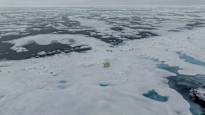The ice cover of the Arctic Ocean will shrink considerably in the coming decades. This will change both the region’s climate and the marine ecosystem.
As the climate warms, the Arctic Ocean is rapidly losing its ice cover. This will have revolutionary effects on the climate of the northern regions, as well as on the marine ecosystems.
Researchers from the Norwegian Polar Institute have returned from their three-week research trip to the Arctic Ocean and published a report on their research results In the journal Nature Communications. Tells about it Norwegian public radio NRK.
The ice acts as a cover of the water mass for a large part of the year. When the cover is removed, the water can mix more than now.
The water in the Arctic Ocean is strongly stratified. Beneath the ice is a cold layer with a lower salt content than in deeper, warmer layers.
The warm water coming from the lower layers can intensify the melting of the ice, i.e. climate change intensifies itself.
At the same time, more nutrients begin to move to the surface layers from the base. This increases the amount of phytoplankton in the surface waters, which increases the zooplankton that eats the phytoplankton and the larger animals that eat it. The number of animals and fish in the Arctic Ocean is likely to increase.
However, the species is changing, as some of the animals are dependent on the ice.
Scientists are uncertain about changes in algae concentrations because algae need sunlight to grow.
According to Norwegian scientists, the ice in the Arctic Ocean will decrease significantly in the coming decades. This also changes the climate of the area. For example, the wind is predicted to increase.
